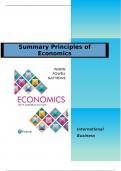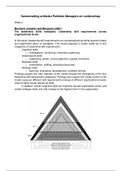Samenvatting
Summary book Economics 10the Edition
This summary contains the following chapters 1, 3, 4, 5, 6, 10, 11, 12, 13, 20, 21, 22 of the book Economics, 10th European Editions by Parkin, Powell and Matthews. This book is compulsory for the module Principle of Economics during the 1st year of International Business part-time.
[Meer zien]





